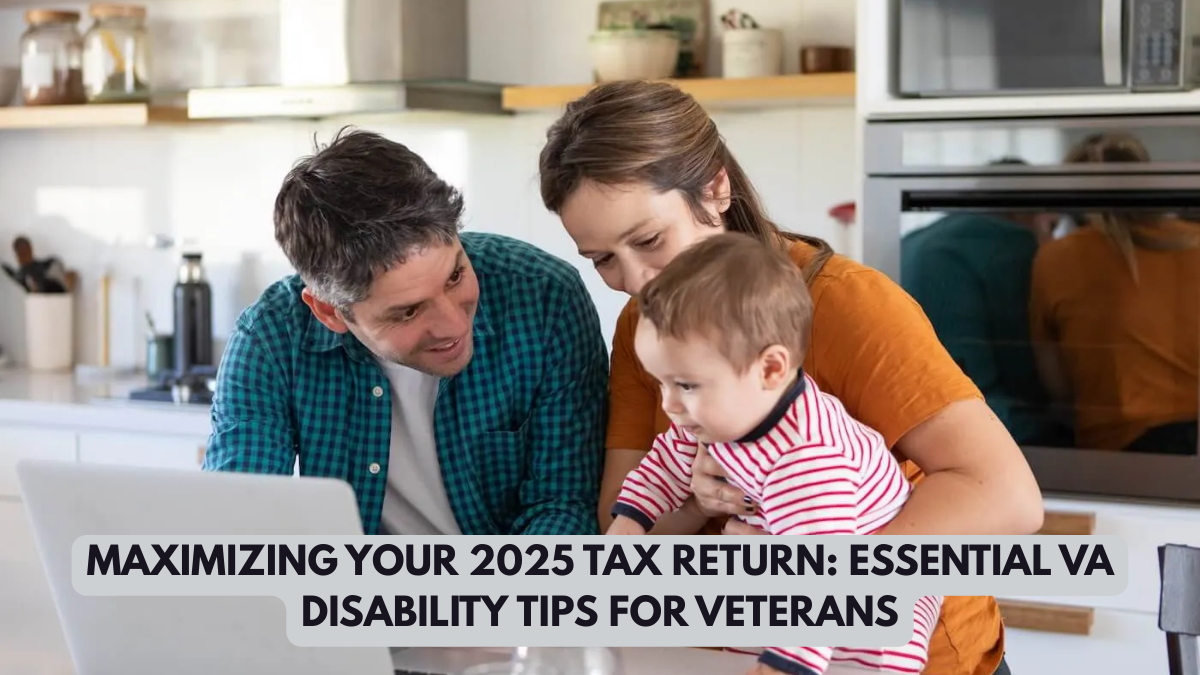As tax season rolls around, veterans who receive VA disability compensation may be wondering how their benefits affect their tax returns and how they can maximize their refund. Fortunately, there are several key tax benefits and strategies available to veterans, and understanding these can help ensure that you receive the best possible outcome. Here are some essential tips and insights for veterans to maximize their tax return in 2025.
1. Tax-Free VA Disability Compensation
One of the most important benefits for veterans with a disability rating is that VA disability compensation is tax-free. This means that the money you receive from the Department of Veterans Affairs (VA) for your service-connected disabilities is not included in your taxable income. It does not need to be reported on your tax return.
The tax-exempt status of these payments applies to monthly disability compensation, pension payments, and certain VA grants, such as home modification grants. You do not have to worry about reporting these payments or paying taxes on them. For more information on VA disability benefits and taxes, visit the VA official website.
2. Property Tax Exemptions for Disabled Veterans

Many states offer property tax exemptions or reductions for veterans with service-connected disabilities. These exemptions can vary significantly from state to state, so it’s crucial for veterans to understand the benefits available in their state of residence.
For instance, Florida offers a $5,000 property tax exemption for veterans with at least a 10% disability rating. Veterans with a 100% disability rating can qualify for a full exemption from property taxes. Similarly, Indiana provides a $24,960 deduction on the assessed value of a property for veterans with a 100% disability rating.
To take advantage of these exemptions, veterans must apply through their local property tax office. To learn more about property tax exemptions in your state, check with your state’s tax office or visit TurboTax’s guide for veterans.
3. Earned Income Tax Credit (EITC)
Disabled veterans who have earned income may qualify for the Earned Income Tax Credit (EITC), a valuable tax benefit that can provide a significant boost to your tax refund. The EITC is a refundable credit, meaning that it can reduce your tax liability or result in a refund, even if you owe no taxes.
Eligibility for the EITC depends on factors like income, filing status, and whether you have qualifying children. Veterans who have earned income, including employment wages or self-employment income, should check their eligibility for this credit. For more details, visit the IRS EITC page.
4. Amended Returns for Retroactive Disability Rating Increases
If you have received a retroactive increase in your VA disability rating in 2025, you may be eligible for a tax refund. If your disability rating was increased retroactively, you may have paid more taxes than you should have in the past.
In this case, veterans can file an amended tax return to claim a refund for the taxes they overpaid due to the rating change. The IRS allows taxpayers to file an amended return within three years of the original return’s filing date. Veterans should consult with a tax professional or visit the IRS website to learn how to file an amended return.
5. Tax-Free Education Assistance
Veterans who are pursuing education using benefits from the GI Bill or other VA education programs should note that these benefits are tax-free. The money received through these programs is not considered taxable income and does not need to be reported on your tax return.
Education benefits can cover tuition, fees, housing allowances, and other related costs. Since these payments are not taxed, veterans do not need to worry about adding them to their taxable income. For more information, visit the VA education benefits page.
6. Utilize Free Tax Preparation Services
Tax filing can be confusing, especially when dealing with military benefits and deductions. Fortunately, veterans have access to free tax preparation services through programs such as MilTax. Offered by Military OneSource, MilTax provides free online tax filing software and phone consultations with tax professionals who specialize in military-related tax issues.
Additionally, veterans can seek assistance from Volunteer Income Tax Assistance (VITA) programs, which offer free tax preparation for those with lower income. For more information on MilTax and free tax assistance, visit Military OneSource and the VITA program page.
7. Claim Medical Expense Deductions

Veterans who have incurred significant unreimbursed medical expenses due to their disabilities may be able to claim a deduction for these costs. You can deduct the portion of your medical expenses that exceed 7.5% of your adjusted gross income (AGI).
Eligible expenses can include prescription medications, doctor visits, medical equipment, and travel expenses related to medical care. Keep track of these expenses throughout the year, and consider working with a tax professional to ensure you’re maximizing your deductions. For more details on medical expense deductions, visit the IRS medical expenses page.
8. State-Specific Benefits
In addition to federal tax benefits, veterans may be eligible for state-specific tax breaks. Some states provide tax-free military retirement pay, special credits for veterans, or additional property tax exemptions. It’s important for veterans to research the specific benefits available in their state.
Each state has its own tax rules, and some benefits may depend on factors such as your service history, disability rating, or income. Check with your state’s Department of Revenue or visit websites such as MilitaryMoney.com for more information.
Conclusion
Veterans with a disability rating have access to numerous tax benefits that can help them maximize their returns and reduce their tax liability. By understanding these key benefits and leveraging free tax preparation services, veterans can make the most of their tax situation in 2025. For additional guidance, consider consulting with a tax professional who specializes in veterans’ tax issues.

Outside of work, he enjoys playing chess, following cricket, and writing short stories. His commitment to integrity and in-depth analysis strengthens OTE News’ mission of providing trustworthy journalism.




